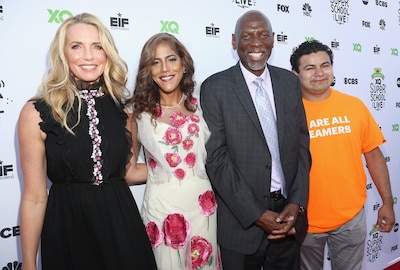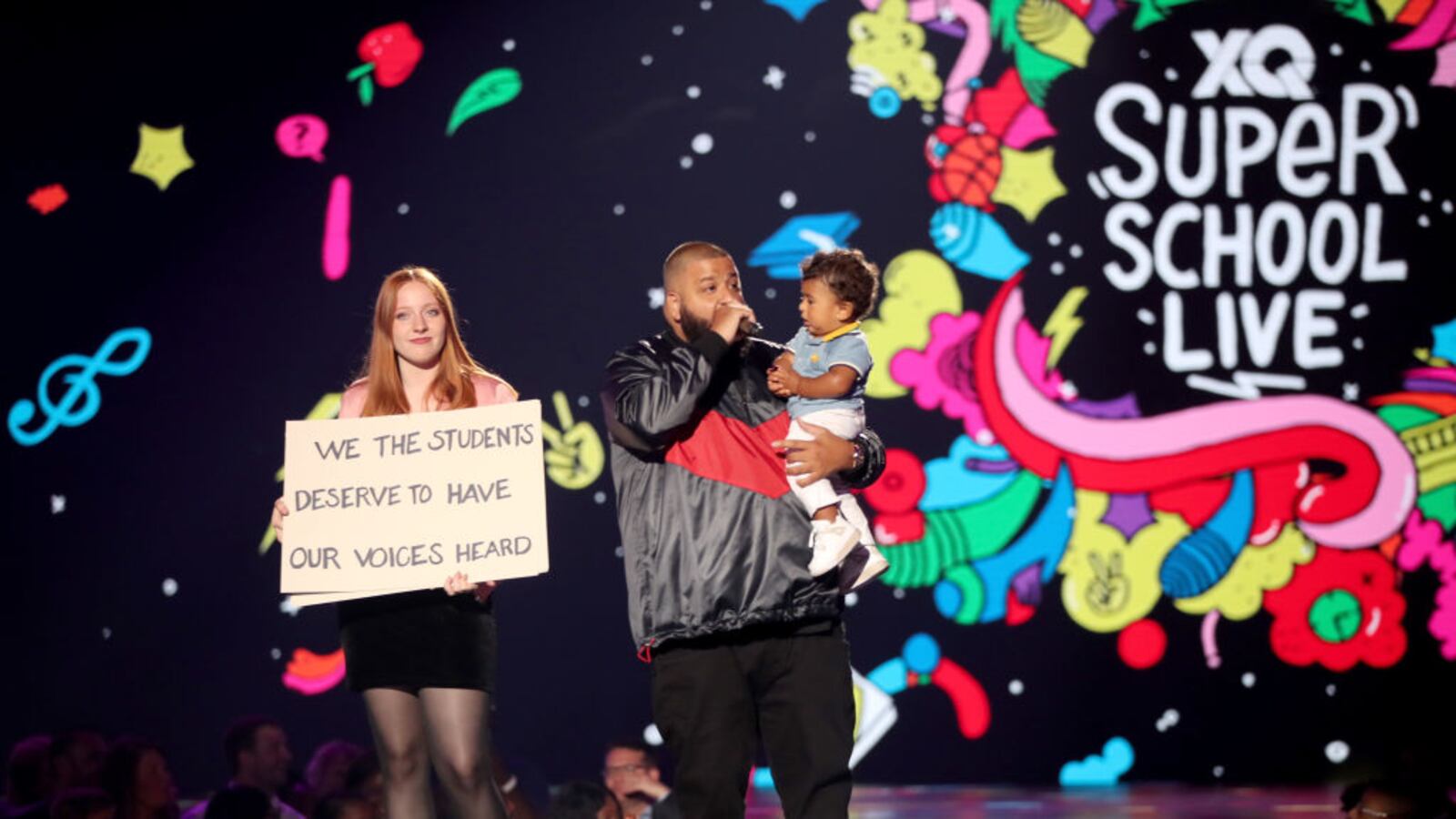The live, prime-time TV special had Jennifer Hudson singing, Tom Hanks driving a school bus, and Kelly Clarkson singing some more.
Their message was that America needed to reinvent high school. But although the 2017 show — a pricey effort by XQ, the nonprofit backed by Laurene Powell Jobs — attracted over 25 million viewers on a Friday night, it didn’t translate into the cultural moment the organization had hoped for, according to a former employee and another person with knowledge of XQ’s inner workings.
The TV special didn’t lead to the number of new social media followers the organization had counted on. Press reaction was tepid, even downright skeptical. And a later effort to get an Emmy nod for the special, including videos with the tagline “for the consideration of our students” — a play on the phrase “for your consideration” — didn’t pan out either.
It’s an example of how XQ, one of the most ambitious and best-funded school reform initiatives to launch in recent years, has struggled to translate its spending and unconventional strategy into widespread attention to its cause. The organization spent $127 million between 2015 and 2017, and has committed tens of millions more to teams that won XQ’s competition for innovative school designs.
But some of those teams have since run up against substantial, if common, roadblocks like unfriendly school boards and questions about low test scores. Three of 19 have not opened or expanded as planned; a fourth closed this year.
At the same time, a number of school leaders say the XQ has helped them launch high schools doing novel things, and they’re working hard to help other schools learn from their experiences. Nearly three years after announcing the first winners, XQ says even some of losing teams have continued working to open new schools — evidence that the competition has grown into a nationwide movement.
Has it? Scott Bess, who runs Purdue Polytechnic High School in Indianapolis, one of the winning schools, is optimistic about the XQ’s ability to make a broader impact. “The point of this wasn’t to get 15 or 16 schools that are successful, but to say the things that those schools are doing are now starting to show up in 4,000 schools,” he said. “Obviously, the jury is out.”
XQ schools see success, setbacks
XQ launched in September 2015 with former Obama administration official Russlynn Ali at the helm and with financial backing from Powell Jobs’ Emerson Collective. (Emerson is a funder of Chalkbeat through the Silicon Valley Community Foundation.)
Its goal was to change how American high schools worked. XQ pointed to the hundreds of thousands of students who drop out each year and surveys showing that most high schoolers don’t feel school is relevant to their daily lives. The experience hasn’t changed in 100 years, and badly needed fresh ideas, its leaders said. (That’s a common argument in education, and historians say it has some truth, but that schools have also changed in important ways.)
More than 700 teams from all 50 states submitted proposals to the competition XQ launched to identify and catalyze ideas for new kinds of schools. A year later, XQ announced that 10 teams had won $10 million to turn their ideas into reality over five years.
In the years since, more groups have won grants, bringing XQ’s total promises to $136 million across 19 teams.
Most of the XQ winners are now up and running. There’s a Washington, D.C. school that prioritizes computer science and getting real-world internships for all of its students. Another is a racially integrated school in Memphis focused on project-based learning, whose founder applied after driving by an XQ billboard; a third is a school-within-a-school meant to mirror a high-tech office in Florida. A school in Los Angeles focuses on helping homeless students, while another in Grand Rapids is based in an old museum.
It’s too soon to judge their records — most have grown slowly and still serve a small number of students — but some can point to early results, like Washington Leadership Academy, which has received top marks from D.C.’s charter board.
Others say they’ve seen less tangible successes.
“[We’re] redefining what education can look like in Memphis,” said Chris Terrill of Memphis’ Crosstown High School. Many local schools, he says, have been under pressure to focus too much on raising test scores, while his school has emphasized projects. A human geography class researching the experience of Somali refugees, for example, wrote about it and then physically recreated a Somali-style household. “It’s this moment for people that gave them goosebumps.”

Four winning XQ teams haven’t opened schools as planned, though, and their struggles underscore the headwinds XQ faces in its effort to show that high school can be reinvented with enough money and the right ideas.
Compass Academy in Denver, for example, received an XQ grant to help it expand from middle school to high school, but it’s had to put those plans on hold. The existing middle school earned the district’s lowest rating for its first two years, and the Denver school board won’t allow Compass to add grades until it improves. (Results for the 2018-19 school year aren’t out yet.)
Compass’ executive director Marcia Fulton said the school is working to do just that, but also argued that the evaluation, which focuses on test scores, gives short shrift to the school’s work on social-emotional skills and bilingual education for its mostly Hispanic students.
XQ has continued to back them. “They rolled up their sleeves,” Fulton said, asking, “What else can we be doing? What supports do you need?”
Meanwhile, in Somerville, Massachusetts, a winning XQ team known as Powderhouse Studios saw its proposal for a 40-student school be unanimously rejected in March by the local school board. The superintendent cited potential financial strain on the district.
Alec Resnick, the head of Powderhouse, says the team is considering potential next steps, including reapplying to the district or bringing some of the ideas elsewhere. A spokesperson for XQ said the grant to Powderhouse was no longer active.
In Oakland, where XQ itself is based, the charter network Summit Public Schools won $10 million to open a school there. It scrapped that plan just months later, and the XQ money ended up supporting an existing Summit school in Daly City, California.
“It became a situation of where it was like, wait, what’s going on here? What do you mean there’s going to be a new charter school?” said James Harris, an Oakland school board member. Summit had not garnered enough support locally, he said, particularly as debates were swirling in the city about whether the district already had too many schools.
A spokesperson for Summit declined to comment on its experience in Oakland. XQ has since awarded a separate $10 million grant to Latitude High School, a charter school there that opened last year.
Finally, Design Thinking Academy, a charter school in Delaware, announced in May that it was shutting down at the end of this school year amid declining enrollment, among other challenges. XQ terminated its partnership with the school in April after issuing only $2.1 million of the awarded $10 million.
“XQ has been very concerned about DTA’s lack of progress toward implementing the Team’s Super School Application,” CEO Ali wrote in a letter to the school’s leadership, posted by a local blogger. “DTA is not using innovative approaches to curriculum and teaching.”
Are these sorts of setbacks simply to be expected for schools looking to shake things up?
“To have that kind of mortality rate at the end of three years — that would strike me as high given that huge amount of money,” said Larry Cuban, an emeritus professor at the Stanford Graduate School of Education who has written about innovation in education.
Others see it as part of the innovation process.
“Clearly not all the investments they made turned out,” said Bess. “They didn’t want to be safe and wanted to stretch a little bit, and when you do that, not everything works.”
The other side of XQ: trying to build national momentum
As many of those schools were trying to get off the ground in 2017, XQ was working to pull off its star-studded TV special. The organization has launched a number of other initiatives in the years since, including a campaign to encourage people to run for school board and a series of live events with Pop-Up Magazine that featured “stories, selfie confessionals, viral gratitude, and multimedia adventures.”
It’s not clear how much these efforts outside of schools have borne fruit, though.
The TV special asked viewers to send a text to sign up for messages from XQ. The organization declined to say how many people receive its those messages, only that it has 300,000 combined social media and text subscribers. (One recent XQ text: “What happens when you let students take the lead in their own learning?” and a link to information about a lesson at one XQ school.)

But the former XQ staff member said the sign-up effort was only modestly successful, even though the special did drive eyeballs to the issue of improving public education. According to the source with knowledge of XQ, disappointment about the special led to a new idea to garner attention: get an Emmy nomination for the TV program. (Both sources spoke on the condition of anonymity because they signed non-disclosure agreements.)
With Emmy voting underway in 2018, XQ’s social media accounts began posting videos with the tagline “for the consideration of our students.” A news story about XQ appeared on the awards show’s website. And throughout the June 2018 voting period, the organization dispatched a branded bus across Los Angeles, an effort meant in part to drum up awareness among Emmy voters, according to the source.
An XQ spokesperson said the special was successful in a number of ways, including its millions of viewers. The “primary goal” of the June 2018 bus tour through Los Angeles “was connecting with students through local community partners,” XQ’s chief marketing officer Chrysi Philalithes said in a statement.
Even some viewers sympathetic to XQ’s mission left the TV special confounded. “I think it was hard to discern the takeaway and wished there was more guidance about what to do as an action step,” said Nick Melvoin, a Los Angeles school board member who attended the live TV production in person.
And what kinds of change, exactly, XQ wants people to get behind remains unclear to some.
“They’re definitely trying to stay on this level of supporting innovation but not claiming a side in what have become perhaps overly ossified division in education politics,” said Sarah Reckhow, who studies education philanthropy at Michigan State.
That may have helped XQ avoid some polarizing aspects of the current school reform debate, like arguments about the value of charter schools, but it may have also made it harder to galvanize support.
XQ’s claim that it has started a nationwide movement “seems overblown,” said Reckhow. “The charter school movement — that is a real thing. I don’t even know what the XQ movement would be.”
“While we want to see a movement around high school transformation because of the need for change, we have never thought that we could build one alone,” XQ’s spokesperson said. “We are trying to support one on behalf of our nation’s young people and empower the folks who are hungry for change.”
Zak Malamed, a former XQ employee who helped organize the bus tours, said as he traveled around the country, he heard from people inspired by the competition. “It galvanized people to think about the future of school in ways that they weren’t — or didn’t feel like they could have — before,” he said.
Regardless, XQ’s efforts have come with a substantial price tag. Tax filings in 2016 list $43 million in expenses, including $38 million for a national bus tour. In 2017, the organization listed $58 million in expenses, including grants for winning schools; $26 million went to “movement building,” including the TV special. Those numbers don’t include most of the over $100 million promised to schools.
XQ did not respond to questions about the total cost of the TV special or the Los Angeles bus tour.
One point of comparison is the $100 million donation by Mark Zuckerberg to Newark’s public schools, which now serve about 50,000 students.
XQ said it expects 16 of its winning schools to be open next year, serving nearly 10,000 students — far fewer students than Newark, for a roughly similar amount of money directed to schools. But the number of students in XQ schools will likely grow since many plan to expand, and XQ’s mission extends beyond those individual schools.
Can XQ schools help others innovate?
In some cases, winning an XQ grant has come with its own challenges. The former staff member said that the size of the awards made tensions within some winning teams nearly inevitable, as members had to decide how to spend the money and which of them would have the final say. In some cases, this led to delays in the money reaching school teams.
Stacey Kane, the co-founder of Washington Leadership Academy, said the money had indeed led to intense debate. “We had many different ideas for how it should be spent,” she said. The school won XQ’s first competition in 2016, but just completed the first year of the five-year grant, a delay Kane said was in part due to that disagreement.
Eventually, Washington Leadership Academy developed a set of guidelines for spending the money to make sure as many students as possible benefit from XQ’s millions. So far, the school has used it to create a “competency-based” English curriculum and a set of computer science course tracks, including a series of classes meant to prepare students to study the subject in college and other courses to help students earn a certification that could lead to a job.
The school has largely scrapped early efforts to use virtual reality in class, something Kane said was a result of there being very little educational content to draw from. The computer science work, though, is something she thinks other schools could learn from.
“We wanted to make sure that whatever it was benefited our kids and kids in other high schools, because we recognized we were incredibly lucky to receive that level of resources,” Kane said, a sentiment echoed by Terrill of Crosstown High School.
The extent to which these schools’ practices spread depends on a lot of factors, including how different and how successful they really are. Some of the XQ schools are spending their money on more bread-and-butter concerns like building renovations, lowering class sizes, or hiring additional staff members while the school is growing.
Other schools nationwide have struggled to implement some of the ideas embraced by XQ schools, like competency-based education, and there’s limited research on whether these concepts will actually improve academic outcomes.
Cuban said there’s another hurdle to spreading these ideas: the appeal of more common structures, which he calls the “grammar” of schooling. “It’s very hard to change the grammar of schooling because most people in America want to keep it the way it is,” he said.
That’s the tide XQ is pushing against, and part of why the organization says it’s invested heavily in both individual schools and storytelling efforts like its recent live events.
“The extent to which they’ve had the greatest impact — it’s serving as an incubator,” said Melvoin, the Los Angeles school board member. “We’re notoriously bad at sharing best practices. I do think there’s something there.”


